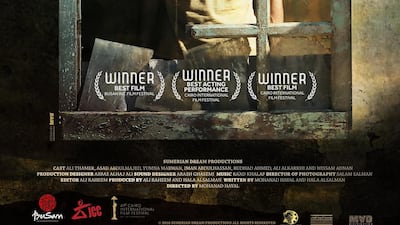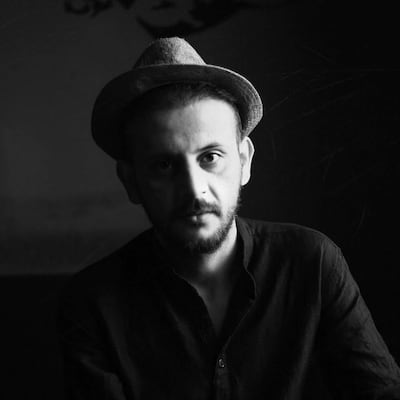It is 2006 and Baghdad is being destroyed by sectarian violence. A 45-year-old translator, Ahmed, arrives at Haifa Street with the intention of proposing to his beloved, Suad. He is a few steps from her building when a sniper fires at his leg and puts him on his back. A passerby lurches forward to help, but the sniper fires a warning shot. He wants Ahmed to bleed to death, alone and in the middle of the street.
From then on, things only get messier and more tragic.
Most of the events in Haifa Street take place between two buildings, with the tension linking them so taut that you need to remind yourself to breathe.
The feature film may be Mohanad Hayal’s first, but it is a masterclass of the “less is more” approach. The dialogue is sparse but sharp. Expository details aren’t magnified, but rather revealed in allusive and organic conversations. The cast – which includes Asad Abdul Majeed, Yumna Marwan, Iman Abdulhassan and Ali Thamer – deliver powerful, memorable performances, divulging more with the emotions they restrain rather than exhibit.
Haifa Street is a family drama more than it is a war film, and it is by no means an easy watch. As far as fiction goes, it is one of the most revealing works on what living in the centre of Baghdad's sectarian conflict was like. And Hayal has experienced that first hand, having worked as a journalist during the war.
“My goal with the film was to make whoever sees it feel the pressures and ambiguities that Iraqis experienced on a daily basis then,” Hayal, who graduated from the University of Baghdad’s College of Fine Arts in 2010, says.
The idea for the film began to form as early as a decade ago, as Hayal was reflecting on the events he faced during the conflict. But it wasn’t until 2014 that he began to seriously work on the script along with Hala Alsalman, an Iraqi-Canadian filmmaker who lives in Los Angeles.
Once the script was finalised, Hayal set his sights on shooting on the real-life Haifa Street “to ensure the realistic nature of the film”. However, the decision brought with it a number of challenges.
“It was difficult to convince producers to shoot the film in Iraq, mostly due to the country’s capricious circumstances,” Hayal says. “Filming on Haifa Street also brought challenges because these bridges and streets are in the heart of Baghdad. We had to block the street and it caused traffic.”
Hayal says most of the people who worked on the film also didn’t have prior experience in filmmaking. “Most of them were my friends, the oldest of whom was 24 years old. The budget was slim, so we couldn’t hire professionals.”
These production challenges caused significant delays to filming, a process that took 40 days spread over three years to complete. However, when Haifa Street finally debuted at the Busan International Film Festival in South Korea, in October last year, it was a hit, and scooped the festival's Best Film award.
The movie, which is being distributed regionally by Mad Solutions, premiered in the Arab world at last year’s Cairo International Film Festival, before being shown at the Carthage Film Festival in Tunis and the Rabat International Festival of Auteur Cinema.
It was screening commercially in Cairo when the coronavirus pandemic struck, derailing the film’s screening circuit.
“The film has just resumed showing in cinemas in Tunisia,” Hayal says. “We’re hoping for it to hit cinemas in the rest of the Arab world soon.”
For Hayal, becoming a filmmaker was not a matter of choice, but more like “an existential necessity”. However, being a filmmaker in Iraq isn’t easy as most of the country’s cinematic efforts revolve around glorifying and praising those in power. The emergence of the country’s independent film scene in 2003 has helped inspire change and co-operation with filmmakers from neighbouring countries.
“Still, I think the situation in Iraq, as far as filmmaking and production are concerned, is the worst in the region,” Hayal says. “That’s mostly due to the absence of government support and the lack of private production companies, so it’s quite confined to individual attempts.”
But there's nothing stopping Hayal from making his next piece of work. He has recently finalised the summary for his next film, which is set in 2020 and revolves around an "invisible world" within Baghdad. "I hope to finish the first draft of the script soon," he says. But for now, he says he is looking forward to seeing how Haifa Street is received by audiences in the region.



